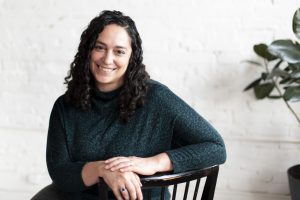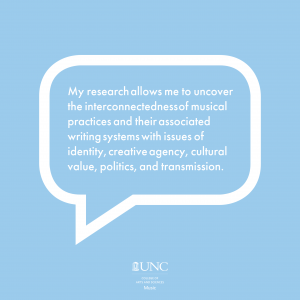
The department is proud to welcome Dr. Elizabeth Elmi to our faculty this year as Visiting Assistant Professor of Musicology. Dr. Elmi holds a Ph.D. in Musicology and an M.A. in Italian Literature from Indiana University and an A.B. in Music and Italian from Vassar College. Specializing in the intersections of music and lyric poetry from late medieval and Renaissance Italy, her research investigates the vernacular song practices of 15th- and 16th-century Italy, as well as other cultural contact zones of the Mediterranean, through questions of orality and literacy, creative agency, politics, and identity. She has been awarded a Fulbright U.S. Scholar grant to the University of Basilicata (Italy) to conduct archival research toward her in-progress book Inscribing the Self in Occupied Southern Italy. Get to know Dr. Elmi a little bit better and find out what she had to say about teaching at Carolina this year!
What is your position on faculty and what courses are you teaching this year?
I am a Visiting Assistant Professor of Musicology. This fall, I am teaching MUSC 56 (FYS: Early Modern Court Spectacle), MUSC 142 (Great Musical Works), and MUSC 254 (Music History I, Antiquity to 1750).
What is your favorite part of teaching?
My favorite thing about teaching is the conversations with my students, both in and out of class. To me, the learning process should be a true exchange of knowledge and perspectives, which allows for critical thought and engagement about music’s historical, cultural, and aesthetic value for all involved. One other really important aspect of teaching music history for me is that it provides a window into past cultures and, at the same time, has the potential to reach across societal and temporal boundaries to affect us in the present day. In this way, it offers so many opportunities to study and teach issues of politics, gender, aesthetics, and patronage in the musical arts and to understand how such issues can be applied beyond one specific historical context.
What is your favorite part of research?
My research allows me to uncover the interconnectedness of musical practices and their associated writing systems with issues of identity, creative agency, cultural value, politics, and transmission. In my work on lyric song from the Kingdom of Naples, in particular, I am able to draw connections between late medieval and Renaissance southern Italy and other cultural contact zones of the Mediterranean. What I love about this work is how it reveals the intricate meanings of various forms of musical expression through a close analysis of primary sources. As an interdisciplinary scholar, I am also fascinated by the intersections of music and poetry that are central to the creation of song repertories.
What is the project that you’re most excited about currently?
 Right now, I am most excited about my book project Inscribing the Self in Occupied Southern Italy, which seeks to redefine the typical historical narrative of southern Italy by understanding the Kingdom of Naples as a foreign-occupied territory and the music of local southern Italians as the creative practice of a subaltern, marginalized populace. This summer, I will be traveling to Università della Basilicata in Potenza, Italy as a Fulbright scholar to conduct the central archival research for this project.
Right now, I am most excited about my book project Inscribing the Self in Occupied Southern Italy, which seeks to redefine the typical historical narrative of southern Italy by understanding the Kingdom of Naples as a foreign-occupied territory and the music of local southern Italians as the creative practice of a subaltern, marginalized populace. This summer, I will be traveling to Università della Basilicata in Potenza, Italy as a Fulbright scholar to conduct the central archival research for this project.
What are some of your non-musical hobbies?
Cooking (especially Italian food) and running—the two things are not unrelated!
If your students could learn one thing from you, what do you hope it will be?
That learning is a collaborative process and practice, and that our job as students (and teachers) is to engage critically with our own perspectives and with those of our peers.
Anything else you’d like students to know about you or your teaching?
My door is always open!
